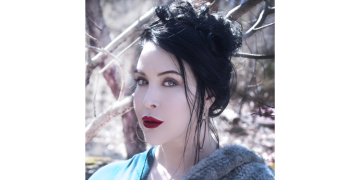Children, according to the old disciplinarian maxim, should be seen and not heard. The title characters of “The Witches,” Roald Dahl’s 1983 fantasy novel, would like to go one step further: They plan to exterminate every child in England by disseminating candy laced with a magic potion that will turn them into mice.
A charming and spirited musical adaptation of Dahl’s much-loved book — written by Lucy Kirkwood and directed by Lyndsey Turner — opened this month at the National Theater, in London, running through Jan. 27, 2024. It’s a deftly rendered production, a high-quality piece of family entertainment that skilfully blends the playful and the macabre, and does justice to the author’s distinct comic style.
In “The Witches,” a precocious boy called Luke (Bertie Caplan) is taken under the wing of his eccentric Norwegian grandmother (Sally Ann Triplett) after his parents die in a car crash. While staying at a hotel in the British seaside resort of Bournemouth, they stumble across the witches — who have convened under the cover of a child-cruelty prevention charity — and get wind of their murderous conspiracy. Luke falls into their clutches, is forced to imbibe the potion and duly morphs into a rodent before scurrying back to his grandmother. He must somehow foil their plot while evading capture by hygienically conscientious hotel staff members.
Caplan delivers an outstanding performance as the young hero, as does Cian Eagle-Service in the role of his spoiled and supercilious pal, Bruno. And Triplett is winningly whimsical as the grouchy-but-kind oddball octogenarian, puffing on cigars and periodically engaging in an intense one-way conversation with a garden gnome.
Katherine Kingsley plays the Grand High Witch with a suitably maximalist, cartoon-villain energy. She’s a haughty and imperious figure, ruling her coven with a combination of charisma and terror. Her minions (including Chrissie Bhima and Tiffany Graves, both superb as Melanie and Kathy) are every bit as compelling in their sycophantic devotion to their crazed leader. Daniel Rigby as the hapless hotelier, Mr. Stringer, is a figure straight out of a Christmas pantomime, bumbling from one calamity to the next.
Although several reference points in the dialogue suggest a contemporary setting, the set (by Lizzie Clachan) evokes a mid-20th century aesthetic, with a color palette heavy on dusty pink and mint green. The seaside hotel, where most of the story unfolds, is sumptuously rendered, and the action is framed by a backdrop depicting the gnarly silhouettes of trees whose branches resemble clawing, spindly fingers. Throw in some remote-controlled mice, dazzling light effects (judiciously deployed by Bruno Poet) and some splendidly angular dance routines (stylishly choreographed by Stephen Mear) and the result is a vivid, intermittently chaotic tableau that is easy on the eyes but still captivating.
The songs, by Dave Malloy, are fairly standard musical fare — retro, cabaret-style crowd-pleasers — but the lyrics are well worked and on point. The Grand High Witch belts out a manifesto inviting parents in the auditorium to “Think of all the things you could do … without a child bursting through the door / You could be wild and free once more.” It’s an arch gambit in a play aimed at a family audience — a winking attempt at divide and rule.
The key number is “Get Up,” an uplifting anthem about the importance of grabbing life by the horns, delivered by a gaggle of children who have been transformed by the witches into inanimate objects — including a vase, a vacuum cleaner and an ornamental clock. The juxtaposition of cutesy, can-do vibes (the song is upbeat and the children look adorable in their costumes) and the inherently sinister scenario (they are trapped in an eternal purgatory) is delightfully perverse.
The playwright and director have been relatively faithful to the darkly comic sensibility that made Dahl so popular among adults and children alike. The makers of two movie adaptations of “The Witches” — Nicolas Roeg in 1990 and Robert Zemeckis in 2020 — both felt the need to rewrite the story’s somewhat discomfiting ending, which they presumably deemed too gloomy for a mainstream audience. (Dahl, who died in 1990, dismissed the Roeg film as “utterly appalling.”) This adaptation doesn’t flinch: Young Luke accepts that he will see out his days in mouse form, but puts on a brave face, insisting that “It doesn’t matter what you are, or what you look like, as long as somebody loves you.”
It’s a strange resolution, for sure — particularly given the largely playful timbre of what has preceded — but that strangeness is integral to the spirit of the story, bearing out the promise (or was it a threat?) issued in the play’s opening lines: “This is not a fairy tale.”
The Witches
Through Jan. 27, 2024, at the National Theater, in London; nationaltheatre.org.






















